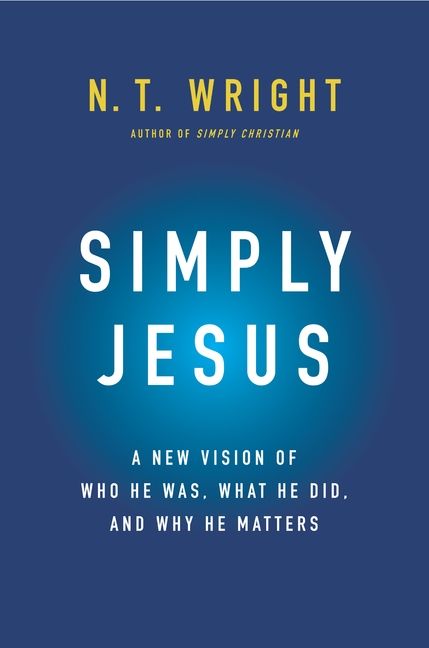
“The church is not supposed to be a society of perfect people doing great work. It’s a society of forgiven sinners repaying their unpayable debt of love by working for Jesus’s kingdom in every way they can, knowing themselves to be unworthy of the task.”
N.T. Wright is a scholar and former Anglican Bishop who has written extensively on the topics he summarizes in Simply Jesus, which, despite the claim of its title, proves that understanding Jesus is anything but simple. As the subtitle states, the book sets out to succinctly explain who Jesus was, what he did, and why any of it matters today (though I don’t believe that anything he proposes would be considered “new”). He tries to do this by sketching out the historical context in which Jesus lived, breathed, died, and was resurrected, focusing on political context and the belief system of first century Jews. He draws heavily on the writings of the four Gospels, as well as various Old Testament prophets and smatterings of other scripture and extensive historical research. Despite the author’s best efforts, the book seems to be stuck somewhere between a convincing apologetic work for skeptics and a source of strengthening for Christians.
Wright explores his subject through the use of an extended metaphor, a convergence of three phenomena into the perfect storm. First is the Roman storm, headed by Caesar, who claimed to be divine and sought imperial power. Next is the Jewish storm, the growing expectation of a second exodus that would result in the judgment of the Gentiles and a return to power for the Jews. And last is the purpose of God, which comes in the man of Jesus. “[…] he was embodying, incarnating, the return of Israel’s God to his people in power and glory.” The metaphor works okay, but it’s just a metaphor, which has inherent limitations. After spending a long time setting it up via an extensive retelling of the story in the non-fiction book The Perfect Storm, he returns to it time and again; but it often results in an obfuscation of the content of the book.
He provides a solid explanation of the centuries-long anticipation of the messiah, which is often difficult to parse from the variegated Old Testament scriptures. The many ways in which the first century Jewish worldview differs from the modern Western one are elucidated in order to show just how unexpected Jesus Christ was in his time. The Jewish people believed that a king would arise from the line of David and that YHWH would again rule over his people; but they did not expect that these things would occur within the same person. There were several “failed messiahs” and kingdom claimers both before and after the time of Jesus—Judah the Hammer, Simon the Star, Herod the Great, Simon Bar-Giora—and Wright compares and contrasts their lives with the life of Jesus.
Setting aside sections describe the ancient perceptions of time, space, and matter, he undercuts the contemporary perception of heaven being a distant place. He points out that the ancient idea was that heaven wasn’t “detached, wasn’t a long way off, but was always the place from which ‘earth’ was to be run.” Jesus, as God incarnate, became a replacement for the Temple, which had previously been where heaven and earth met. As such, his plan obviously wasn’t to retreat to heaven, but to bring God’s Kingdom to earth as it is in heaven.
He is very careful to ensure that he doesn’t paint himself into a political corner, often shooting down the knee jerk reactions to his propositions that would arise from both sides; but in the process he never really pushes any point very strongly (he does offer a half-hearted liberal agenda which seems kind of silly, suggesting that social justice is somehow an integral part of the coming of God’s kingdom rather than a result of it), which leaves me feeling a bit underwhelmed.
There’s more—why Jesus had to die, how Christians should view themselves in relation to the current political powers—but Wright never really says anything that he hasn’t said before, and the detours never seem to work their way back to a strong main thrust. Browsing his other work, it appears he has covered much of the same ground in his massive Jesus and the Victory of God (1996). His shorter, more consumable The Challenge of Jesus (2000) also covers similar territory.
Simply Jesus is fine, I suppose, but inessential. I learned a few small things that I hadn’t encountered before, but the book mostly reiterates a lot of things that won’t convince or dissuade anyone and doesn’t say anything that’s very controversial. Its pacing leaves a lot to be desired, always seeming to push off the real meat of the book (“before we get to that, we must explore this,” etc.) only to arrive at the end without ever really digging into anything too deeply (I suppose the logical response to that is that I should buy his scholarly works). It does a respectable job in its early pages of presenting the historical, political, social, cultural, and religious climate into which Jesus arrived, but its threads never coalesce into a solid whole.
(On a minor note, I disliked Wright’s use of his own New Testament translation. I don’t care that he did it, but the “modern” translation often clashed with the scholarly analysis he was doing.)